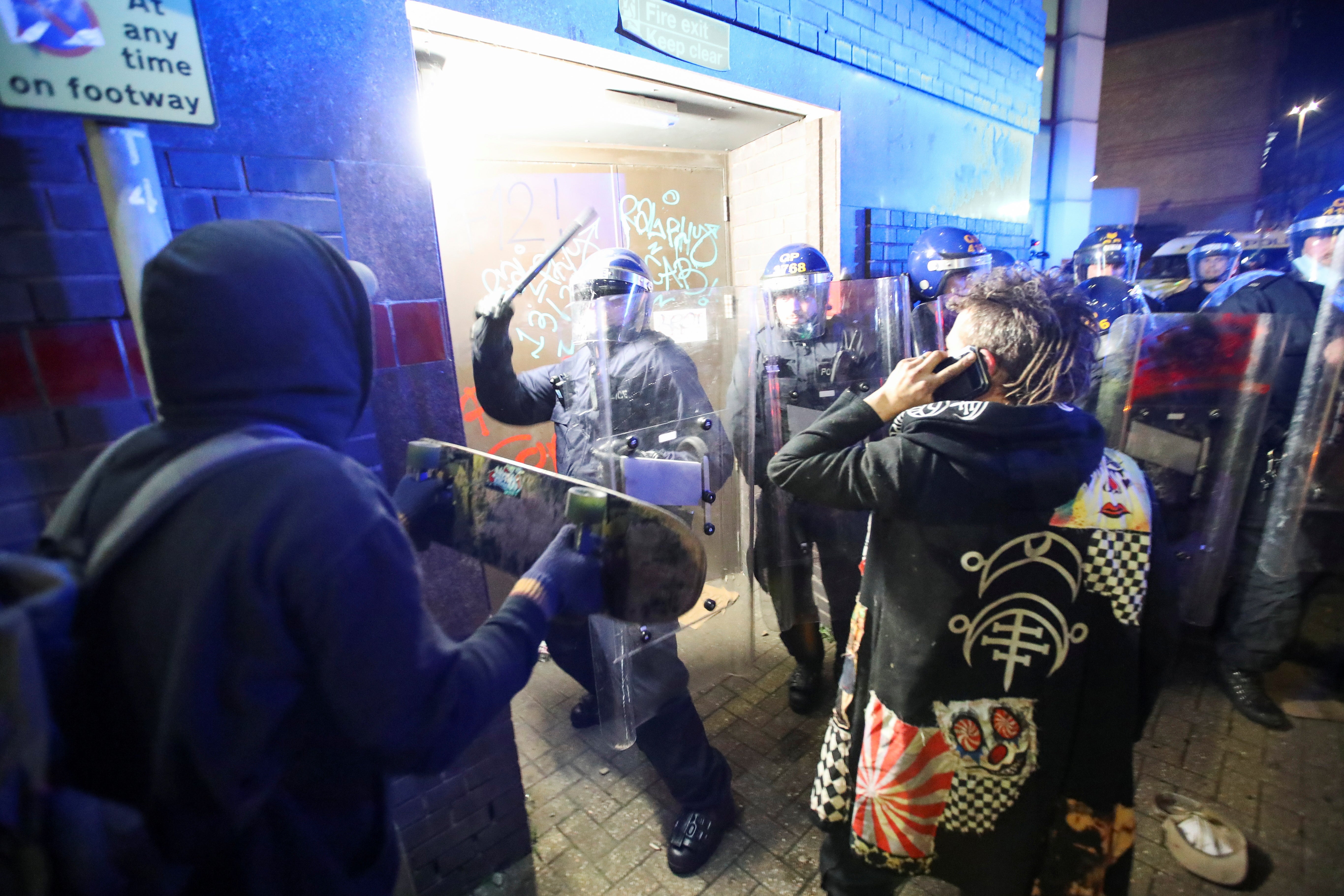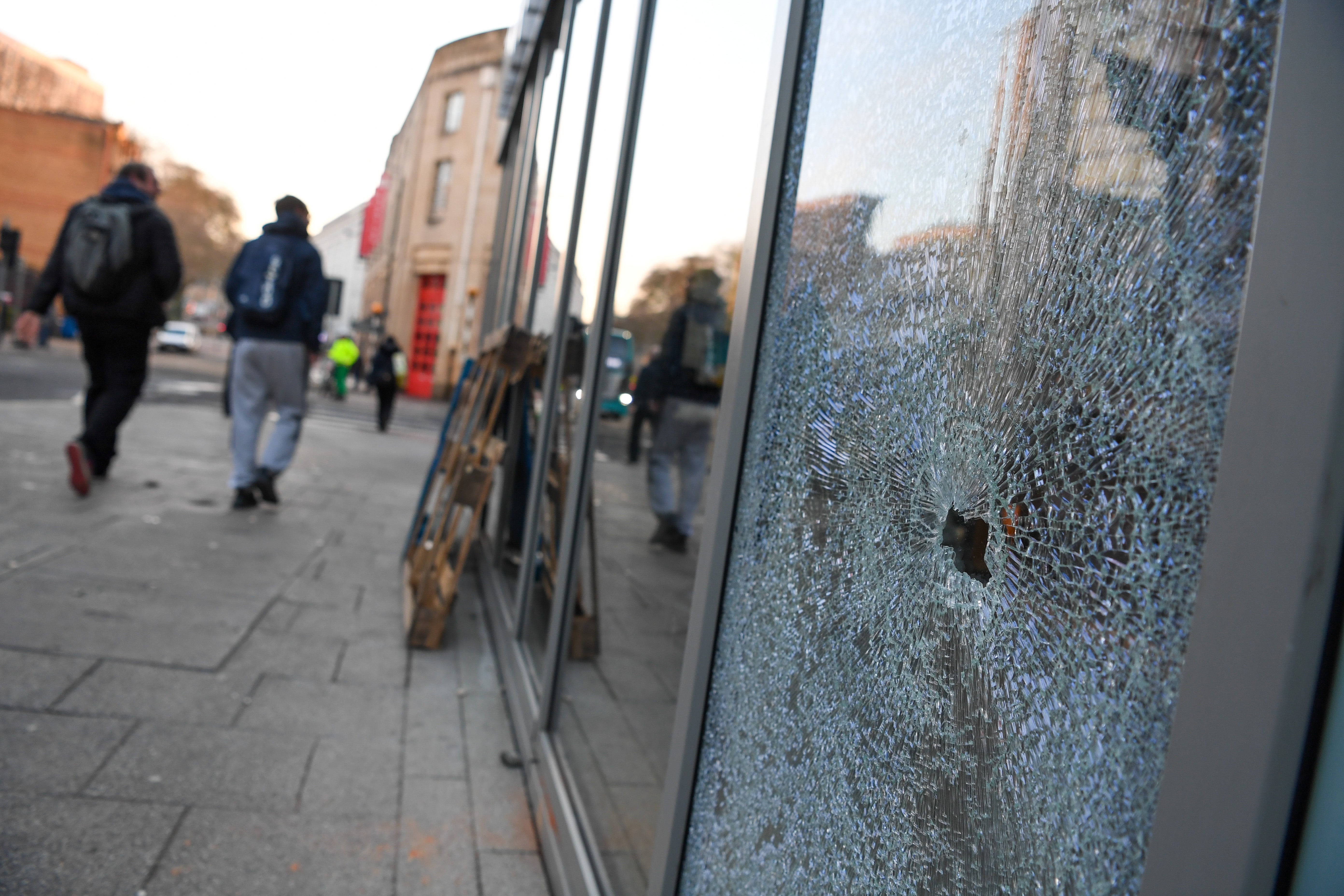Bristol protest: Fears of further violence at ‘Kill the Bill’ protests across country as ‘extremists’ blamed
Patel condemns ‘anarchic’ scenes in Bristol as police investigate ideological link between groups from ‘across the whole country’
Your support helps us to tell the story
From reproductive rights to climate change to Big Tech, The Independent is on the ground when the story is developing. Whether it's investigating the financials of Elon Musk's pro-Trump PAC or producing our latest documentary, 'The A Word', which shines a light on the American women fighting for reproductive rights, we know how important it is to parse out the facts from the messaging.
At such a critical moment in US history, we need reporters on the ground. Your donation allows us to keep sending journalists to speak to both sides of the story.
The Independent is trusted by Americans across the entire political spectrum. And unlike many other quality news outlets, we choose not to lock Americans out of our reporting and analysis with paywalls. We believe quality journalism should be available to everyone, paid for by those who can afford it.
Your support makes all the difference.Police leaders fear that further violence could break out at demonstrations against proposed laws that campaigners say will stifle protest.
Following “anarchic” scenes in Bristol that saw 20 police officers injured, including a punctured lung and broken bones, forces across the country were drawing up plans for further “Kill the Bill” rallies.
John Apter, chair of the Police Federation of England and Wales, compared the situation to a “pressure cooker”.
“Frustration has built up over the past 12 months,” he told The Independent. “Some people will grab any opportunity to turn to violence, while others have got genuine gripes but they will deal with it in the wrong way.
“When you combine frustration [following lockdowns] and warmer weather, with the bill announced and the easing towards the ending of lockdown, there is almost this perfect storm which is a real and genuine concern for colleagues.”
Investigators were combing footage taken at Sunday’s demonstration in Bristol, where a police station was vandalised and vehicles set ablaze, to look for instigators.
The Independent understands that detectives are looking at potential ideological motives for the actions of a minority of protesters, and the extent to which their actions were premeditated.
Andy Marsh, the chief constable of Avon and Somerset Police, said a demonstration that proceeded peacefully for hours had been “hijacked by extremists” intent on vandalism and attacking police.
Read more:
- Police in clash with protesters at ‘Kill the Bill’ rally in Bristol
- Bristol protest: Priti Patel says demonstrators were ‘selfish’ as seven arrested after 20 police officers injured
- Why are protesters opposing the policing bill?
- Policing bill: Plan to crack down on protests passes first Commons hurdle despite civil liberties warning
- New protest laws ‘go too far’ and are not needed, police commissioners say
He said the protest had been attended by connected groups that “come from across the whole country”.
“We’re all worried,” he told The Guardian. “We’ve talked about reflections on what happened in Bristol and what we need to do to keep our communities safe in Bristol and across the country. Over the next few weeks it’s a very difficult time in policing.”
Mr Marsh did not name an ideology behind the “extremists”, but anarchist flags and symbols were seen in the crowd outside New Bridewell police station.
Addressing the House of Commons on Monday, Priti Patel condemned what she called “anarchic and violent” scenes.
“The scenes in Bristol yesterday were utterly shameful,” the home secretary said. “We saw criminal thuggery and disorder caused by a minority who put lives at risk.
”Our exceptional and brave police officers put themselves in harm's way to protect the public. For them to face the criminal violence against them while upholding the law is completely unacceptable.”
Police said between 2,000 and 3,000 people had gathered at Bristol’s College Green to protest against the new Police, Crime, Sentencing and Courts Bill, which will see the police handed controversial new powers to restrict demonstrations.

Mr Marsh said there had been no prior intelligence to suggest any disorder was planned on the scale seen, adding: “From the initial gathering of around 2,000 to 3,000, which was more than we anticipated, there were about 50 officers engaging with those present and encouraging them to disperse.
“There was a hardcore of serious criminals hidden within those 3,000 people, perhaps 400 or 500 people, and we certainly didn’t trigger this.
“The officers were incredibly patient, incredibly professional and I pay tribute to them.”
Mr Marsh said 12 police vehicles were damaged, including two that were set on fire, and “significant damage” was caused to New Bridewell police station.
Officers were pelted with stones, missiles and fireworks, he said, with one officer suffering a punctured lung and broken ribs, and another a fractured arm. Both have since been discharged from hospital.
Seven people had been arrested by Monday afternoon, six for violent disorder and a seventh for possession of an offensive weapon, and police were to launch an appeal for others wanted for questioning.
Speaking to broadcasters at BAE Systems in Preston, the prime minister called the events in Bristol unacceptable.
“People obviously have a right to protest in this country but they should protest peacefully and legally,” Boris Johnson added.
Further protests are planned over the Police, Crime, Sentencing and Courts Bill, which passed the first hurdle in the House of Commons last week and is undergoing parliamentary scrutiny.

The legislation, running at almost 300 pages, contains a huge range of new laws, including tougher penalties for knife carriers and killer drivers, but proposals for protests have sparked particular alarm.
The draft section on “public order” states that conditions can be imposed on demonstrations if the noise generated “may result in serious disruption to the activities of an organisation” or may “have a relevant impact on persons in the vicinity of the protest”.
It creates a new public nuisance law that would make causing “serious annoyance or inconvenience” a crime punishable by up to 10 years’ imprisonment.
And it would give the home secretary and her successors the authority to define “serious disruption to the life of the community” and “serious disruption to the activities of an organisation”.
The Labour mayor of Bristol, Marvin Rees, said he had “major concerns” about the law and believed it could impose disproportionate controls on peaceful protests and freedom of expression.
But he added: “Smashing buildings in our city centre, vandalising vehicles, attacking our police will do nothing to lessen the likelihood of the bill going through.
“On the contrary, the lawlessness on show will be used as evidence and promote the need for the bill.”

Join our commenting forum
Join thought-provoking conversations, follow other Independent readers and see their replies
Comments